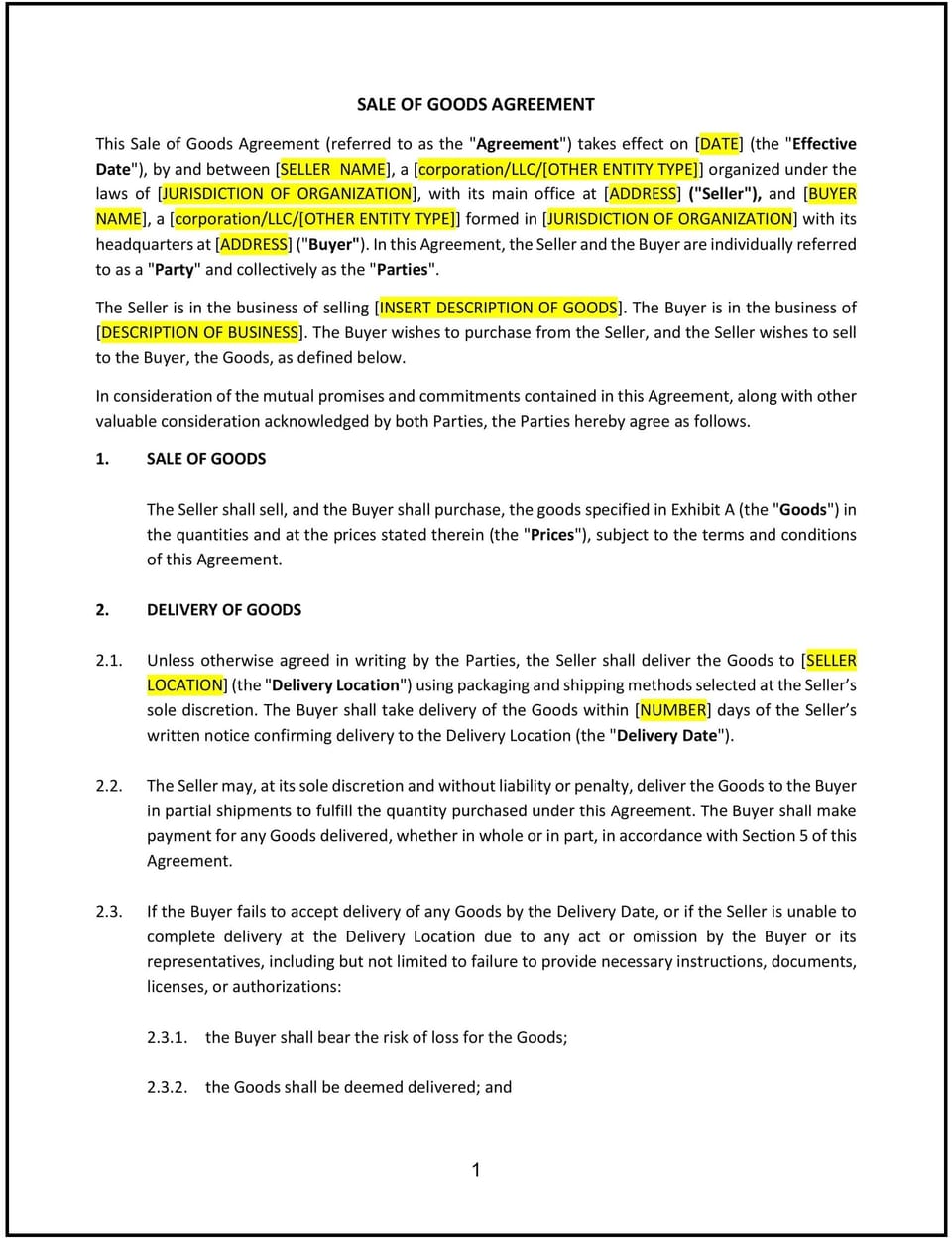Sale of Goods Agreement (Pro-Seller) (Indiana): Free template

Sale of Goods Agreement (Pro-Seller) (Indiana)
A Sale of Goods Agreement (Pro-Seller) in Indiana is a legally binding contract that defines the terms under which a seller provides goods to a buyer. This agreement protects the seller’s financial and legal interests by specifying payment obligations, delivery terms, risk allocation, and warranty disclaimers. It is commonly used in industries such as manufacturing, wholesale distribution, agriculture, and e-commerce, where businesses regularly sell goods.
Indiana follows Uniform Commercial Code (UCC) Article 2, which regulates the sale of goods and provides legal standards for contract enforcement, warranties, and risk of loss. Additionally, the Indiana Deceptive Consumer Sales Act applies to certain sales transactions, particularly those involving consumers, requiring businesses to ensure that contract terms are fair and transparent.
A well-structured agreement helps Indiana sellers reduce the risk of non-payment, clarify delivery responsibilities, and define return policies while supporting compliance with state and federal laws.
Tips for drafting and maintaining a Sale of Goods Agreement (Pro-Seller) in Indiana
- Clearly define the goods being sold, including product specifications, quantity, pricing, and any applicable quality standards to prevent disputes.
- Establish payment terms, including invoice deadlines, accepted payment methods, and penalties for late payments. Indiana law allows businesses to impose reasonable late fees if they are disclosed in the contract.
- Outline delivery conditions, including expected shipping times, transfer of risk, and responsibility for transportation costs. Under Indiana UCC Article 2, risk of loss typically transfers to the buyer upon delivery unless the agreement states otherwise.
- Address warranty disclaimers to protect the seller from liability. Indiana law permits sellers to exclude implied warranties such as merchantability and fitness for a particular purpose, but disclaimers must be explicitly stated in writing.
- Define return and refund policies, particularly for industries such as retail and wholesale. While businesses can limit returns, consumer transactions may be subject to additional protections under Indiana consumer protection laws.
- Include a force majeure clause to protect the seller in cases of unforeseen events such as supply chain disruptions, severe weather, or government actions that may impact the fulfillment of contractual obligations.
Frequently asked questions (FAQs)
Q: What should Indiana businesses include in a Sale of Goods Agreement (Pro-Seller)?
A: The contract should outline product details, pricing, payment terms, delivery conditions, warranty disclaimers, and liability protections to ensure enforceable transactions.
Q: How does a Sale of Goods Agreement (Pro-Seller) benefit sellers in Indiana?
A: It helps sellers formalize transactions, protect their financial interests, and reduce the risk of disputes over product quality, delivery, and payment terms.
Q: Are warranty disclaimers enforceable in Indiana?
A: Yes, under Indiana UCC Article 2, sellers can disclaim implied warranties, but they must do so explicitly in writing. Consumer transactions may be subject to additional protections under the Indiana Deceptive Consumer Sales Act.
Q: What happens if a buyer refuses to pay under a Sale of Goods Agreement in Indiana?
A: The seller may take legal action to recover unpaid amounts, enforce late fees, or seek repossession of goods, depending on the terms of the contract.
Q: How should Indiana sellers handle disputes under a Sale of Goods Agreement?
A: The contract should specify dispute resolution methods, such as arbitration, mediation, or litigation in Indiana courts.
Q: Does Indiana require sales tax on goods sold under this agreement?
A: Yes, most sales of tangible goods in Indiana are subject to state and local sales taxes. Sellers must register with the Indiana Department of Revenue to collect and remit applicable sales taxes.
Q: Can a seller refuse returns under a Sale of Goods Agreement in Indiana?
A: Yes, a seller may enforce a no-return policy for business-to-business sales, but consumer transactions may be subject to additional return rights under Indiana law.
This article contains general legal information and does not contain legal advice. Cobrief is not a law firm or a substitute for an attorney or law firm. The law is complex and changes often. For legal advice, please ask a lawyer.


